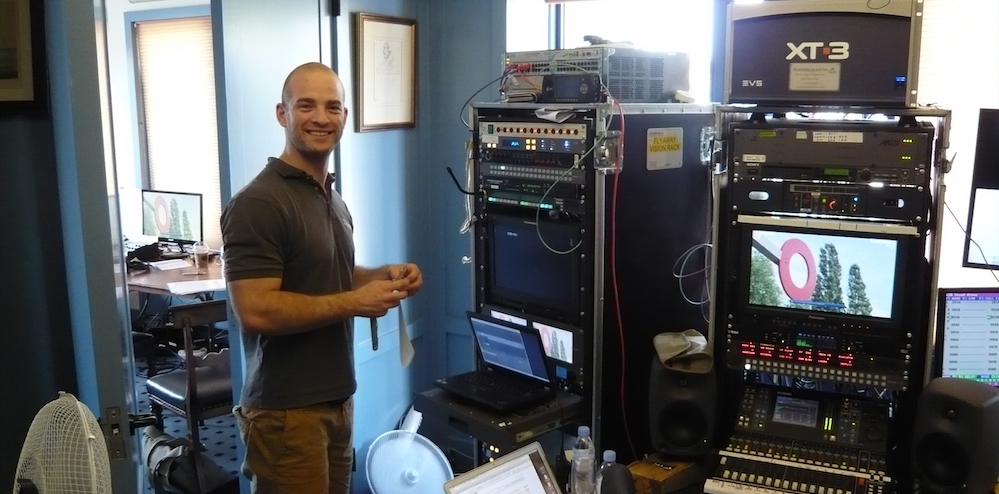
Behind the scenes in television, an extensive technical crew assures the quality and production of broadcasts, led by the broadcast engineer.
You will deal with hardware and broadcast systems used in television, radio, and new media as a broadcast engineer. You must guarantee that programmes are broadcast on time and with high quality. In addition to operating and maintaining the systems, you will update and repair them.
Apprentice broadcast engineers work in many locations and conditions. For example, they may work in a studio, on a set, in post-production, or in outdoor broadcasts, where sound and video are sent live to a studio or the network.
You will work with various people, including producers, studio managers, presenters, and other technical staff.
Responsibilities
Throughout your apprenticeship, you may help:
- set up studio equipment
- install multimedia hardware, software and digital broadcast technology systems
- set up and operate links between studios and outside broadcast (OB) units
- edit programmes live as they’re being transmitted or recorded
- test and service equipment, including repairing faults.
Salary
- Starting salaries for apprentice broadcast engineers vary, but may be in the region of £18,000 to £20,000.
- Experienced broadcast engineers can earn anything from £30,000 to £60,000, with high-end salaries usually reserved for those working within large broadcasting companies in senior lead roles.
Working hours
Working hours can be long and include regular unsocial hours – weekend, evening, and night work is typical due to shift work. In addition, working long hours on short notice may be necessary, particularly for rolling news stations and other live programs.
Working environment
You could work at a TV studio, at a film studio or in a workshop.
Your working environment may be outdoors in all weathers and you’ll travel often.
Qualifications
Qualifications you can achieve as an apprentice broadcast engineer include:
- Level 3 Broadcast and Media Systems Technical Operator – Entry requirements for this level include 4 or 5 GCSEs at grades 9 to 4 (A* to C), or equivalent, including English, maths and science. This qualification takes 22 months to complete.
- Level 6 Broadcast and Media Systems Engineer – Entry requirements for this level include 2 or more A levels, or equivalent, including maths and science, for a higher or degree apprenticeship. This qualification takes 36 months to complete.
Skills
On a broadcast engineering apprenticeship, you’ll learn:
- to be thorough and pay attention to detail
- knowledge of computer operating systems, hardware and software
- the ability to work well with others
- broadcasting and telecommunications knowledge
- the ability to accept criticism and work well under pressure
- to be flexible and open to change
- knowledge of maths
- knowledge of media production and communication
- to be able to use a computer and the main software packages competently.
Employers
The principal employers are terrestrial and digital television networks (such as the BBC, ITV, Channel 4, Channel 5, and S4C in Wales) and the different production companies that create content for these channels.
There are other opportunities with cable, satellite, and digital broadcasters such as BSkyB, foreign broadcasters based in the UK, outside broadcast (OB) corporations, local television, news specialists, and radio production companies.
There are various production and post-production facilities and studios in and around London. Salford is the BBC’s most visible presence outside of London and is home to its main media centre.
Professional development
You’ll work alongside seasoned engineers and technical managers as an apprentice, often switching between teams.
Structured training programmes may lead to chartered engineer (CEng) certification if the Institution of Engineering and Technology (IET) criteria are met.
You must keep up with technological advancements and will often be required to get further training in using new equipment. Employers often provide for this, but if you are self-employed, you must include it in your predicted earnings and work schedules.
Career prospects
As your knowledge and reputation increase, you may eventually specialise in specific systems or technologies or be in charge of upgrading and modifying specialised software.
You may be promoted to team leader after basic training and acquiring sufficient experience. Promotion is based on merit. As a senior broadcast engineer, you can supervise and train a team of broadcast engineers, as well as take part in strategic planning.
This is a competitive field. Because short-term or fixed-term project recruiting is typically based on reputation (smaller organisations may regularly approach experienced freelancers), networking within the industry is crucial to developing a career and maintaining full-time employment.
After several years of expertise, it may be possible to go from a broadcast engineer to a management position in some companies.
